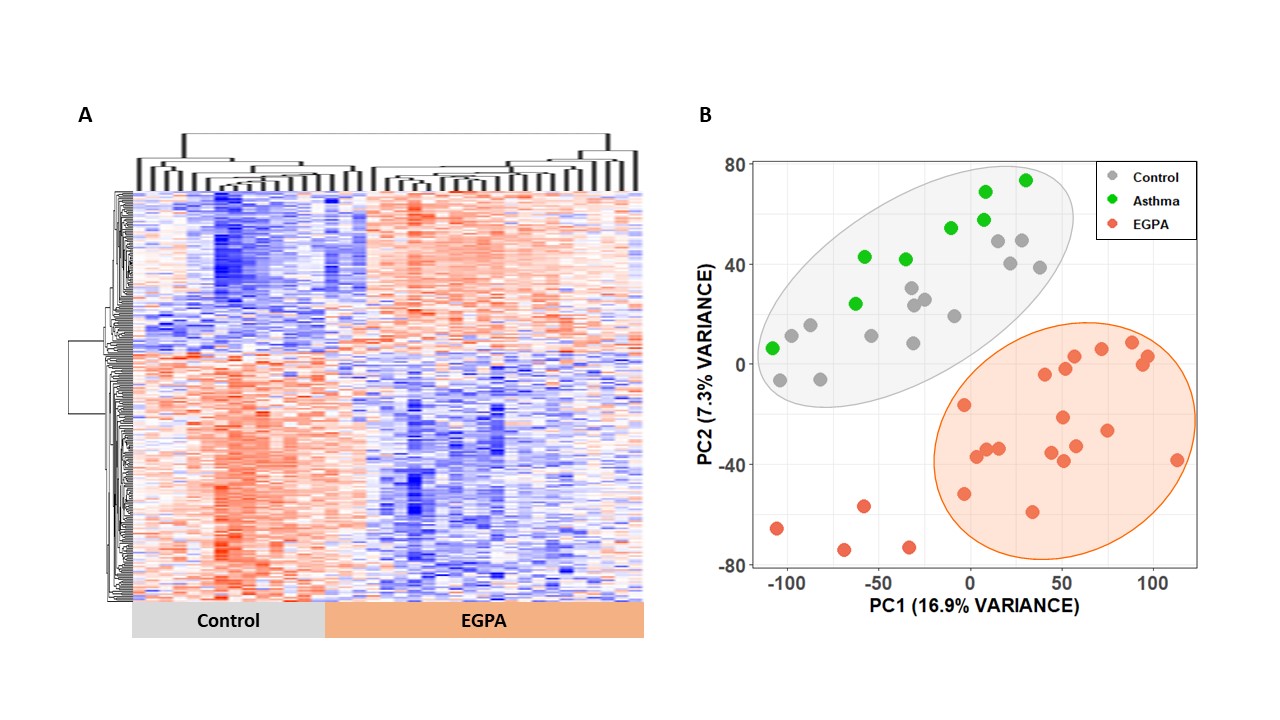Session Information
Session Type: Abstract Session
Session Time: 11:00AM-12:30PM
Background/Purpose: Eosinophilic Granulomatosis with polyangiitis (EGPA) is a rare systemic autoimmune disorder, included within the ANCA-associated vasculitis. It is characterized by a diverse clinical profile, together with an unsatisfactory response to treatment leading to frequent relapses, with chronic asthma being the most recurrent type (1). Its pathogenesis remains unclear, being supported by experimental studies with limited evidence. However, they all indicate that EGPA pathogenesis is mainly driven by Th2 cells (CD4+ T cells), showing oligoclonal expansion in active patients, along with a significant increase in serum levels of chemokines involved in Th2 recruitment and activation (2). Moreover, some genetic variants associated to Th2 activation have been identified in these patients (3). In fact, Th2 cells are known to be the main responsible cell type for the activation of eosinophils, the core effector cells of the disease (4).
The aim of the project is to investigate transcriptomic changes in Th2 cells in patients with EGPA in order to characterize the molecular basis of the heterogeneity of this disease, and to identify pathogenic pathways that could provide clinically useful biomarkers.
Methods: CD4+ T cells were isolated from EGPA patients in remission (BVAS = 0, prednisone dose < 7.5 mg/day) (n=23) and compared to healthy controls (n=14) and non-EGPA asthmatic patients (n=8). Affymetrix Clariom S human microarray was used to analyze whole transcriptome signature. Data processing and differential gene expression analysis (p < 0.001, FC > 1.5) were implemented using Bioconductor, with affy and limma, respectively. Empirical Bayes moderated t-test was used for statistical analysis. Unsupervised hierarchical clustering and principal component analysis (PCA) were implemented to identify clusters among patients with similar features. Gene ontology and pathway enrichment analysis were conducted with GSEA and DAVID, either comparing the whole gene set expression across conditions, or specifically analyzing those genes that were differentially expressed (DEGs) among groups. The most interesting DEGs were validated by qPCR.
Results: 237 DEGs were found among EGPA and control samples, defining two distinct clusters as evidence in the heatmap (fig 1A). PCA of all samples included in the analysis further confirmed these two groups (fig 1B). Pathway enrichment analysis showed significant differences between these two populations regarding Th1 and Th2 cell differentiation, IL2/STAT5 signaling pathway, and TNFα signaling via NF-KB. qPCR specifically validated IL2/STAT5 pathway through various relevant genes, such as CTLA4, CD81, and LTB, suggesting a potential role in the pathogenesis of EGPA.
Conclusion: Our study provides transcriptomic evidence that CD4+ T cell expression profile is altered in EGPA patients. GSEA and DEGs show a potential role of different pathways involved in CD4+ T cell differentiation and activation, potentially mediated by IL2/STAT5 pathway.
1 Wechsler ME et al. J Allergy Clin Immunol. 2023;151(6):1415-1428.
2 Isozaki T et al. J Clin Med. 2020;9(12):3890.
3 Lyons PA et al. Nat Commun. 2019; 10(1):5120.
4 Jakiela B et al. Rheumatology (Oxford). 2012;51(10):1887-93.
Supported by GSK
To cite this abstract in AMA style:
Ríos-Garcés R, Farran N, Naranjo-Suarez S, Alba-Rovira R, Prieto-González S, Tavera-Bahillo I, Solans-Laqué R, Arismendi E, Corbera-Bellalta M, Marco-Hernández J, Kamberovic F, Visocnik N, Cid M, Espígol-Frigolé G. Transcriptomic Changes in CD4+ T Lymphocytes in Eosinophilic Granulomatosis with Polyangiitis [abstract]. Arthritis Rheumatol. 2024; 76 (suppl 9). https://acrabstracts.org/abstract/transcriptomic-changes-in-cd4-t-lymphocytes-in-eosinophilic-granulomatosis-with-polyangiitis/. Accessed .« Back to ACR Convergence 2024
ACR Meeting Abstracts - https://acrabstracts.org/abstract/transcriptomic-changes-in-cd4-t-lymphocytes-in-eosinophilic-granulomatosis-with-polyangiitis/

